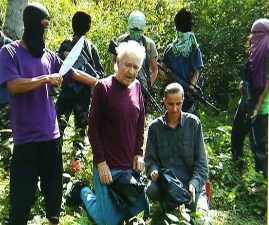
(Reuters) — Al-Qaeda linked Islamist militants in the Philippines said on Thursday (October 2) they will kill one of two German captives on Oct. 17 unless their demands are met.
Rebels from the Abu Sayyaf group captured the two Germans sailing on a yacht from the western island of Palawan to the eastern Malaysian state of Sabah in April.
The militants are demanding a 250 million pesos ($5.6 million) ransom and forGermany to stop supporting U.S.-led air strikes against Islamic State militants inSyria.
“We will take one of these two hostages. Our ultimatum is until October 17, 2014, at 3 o’ clock p.m. After that, one of them are not alive,” a Muslim rebel who identified himself as Abu Rami and said he was a spokesman for Abu Sayyaf, said in a telephone call to reporters based in Zamboanga City in the south.
“We will really behead so that the country will have something to see, unlike the group of Albader Parad before, when they didn’t push through with the beheading. We’re different. We will really do it,” he said.
When asked whether a representative from the German government had been in touch with their group, he said: “No, no one has called. So we feel insulted by this government.”
Philippine security officials say the Germans are being held in the jungles of Jolo, a remote southern island and hotbed of Islamist militants in the mainly Catholic country.
The Abu Sayyaf group has a record of kidnappings, killings and bombings. The militants are known to be holding several other foreigners.
It is not clear if the militants have contacts with Islamic State fighters in the Middle East.
Germany has ruled out taking part in air strikes against Islamic State targets in theMiddle East but it did break a post-World War Two taboo on sending weapons to active conflict zones by agreeing to arm Kurdish fighters battling the militants in Iraq.
In a security forum on radicalism held in Manila on Thursday, the executive director of the government’s anti-terrorism council said efforts were being made to secure the release of the German hostages.
“Of course, the armed forces and the police are conducting efforts to rescue these two hostages, and of course the policy of the government, no ransom policy,” Assistant Secretary Oscar Valenzuela said.
Experts warned that the Abu Sayyaf could push through with their threat of beheading a hostage to regain prominence.
“If (Abu Sayyaf) they will not do that, they will lose their faces, they will lose definitely. And they will be branded as a bandwagon group. If they will be elevated into another level of prominence. That’s what they have done before,” retired intelligence general and current head of a terrorism research group, Rodolfo Mendoza said.
Mendoza also confirmed that recruitment for Islamic State is ongoing in the country.
“And in the Philippines, there are reports that recruitment is going on, and it’s a matter of time when it would be activated – their posting in the battlefield would be activated. There are many factors to consider – do they have enough logistics, money, so and so,” he said.
Abu Sayyaf rose to prominence in the early 2000s by kidnapping foreigners. It has links with al Qaeda, although analysts and Philippine security sources say it has lately been focused on kidnap-for-ransom and other criminal activities.







